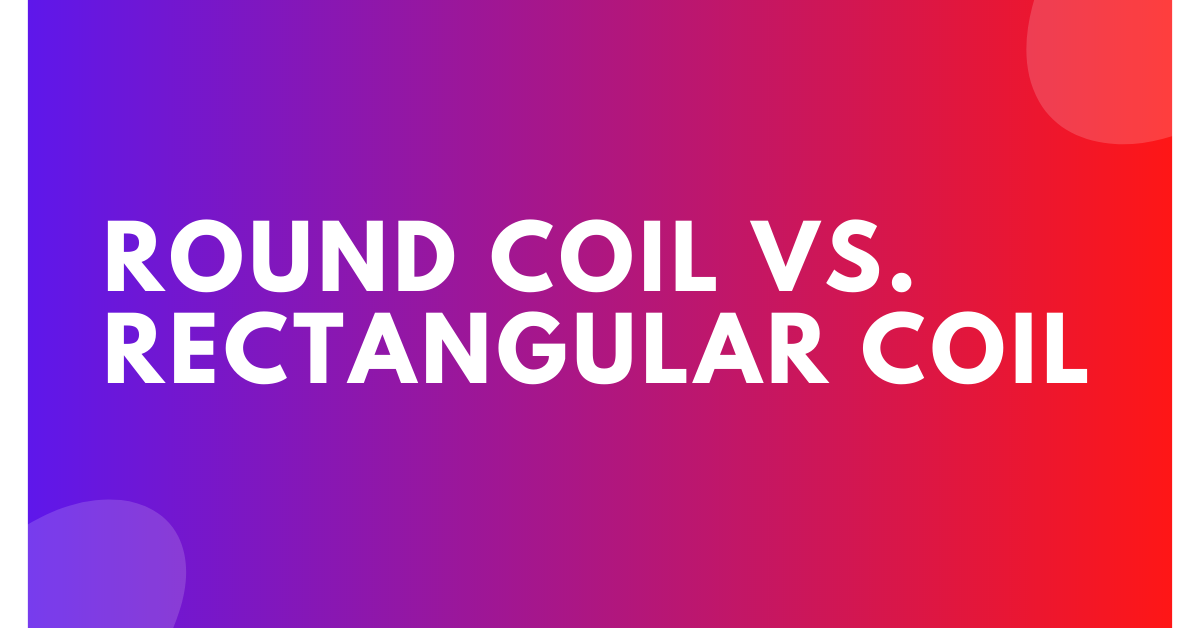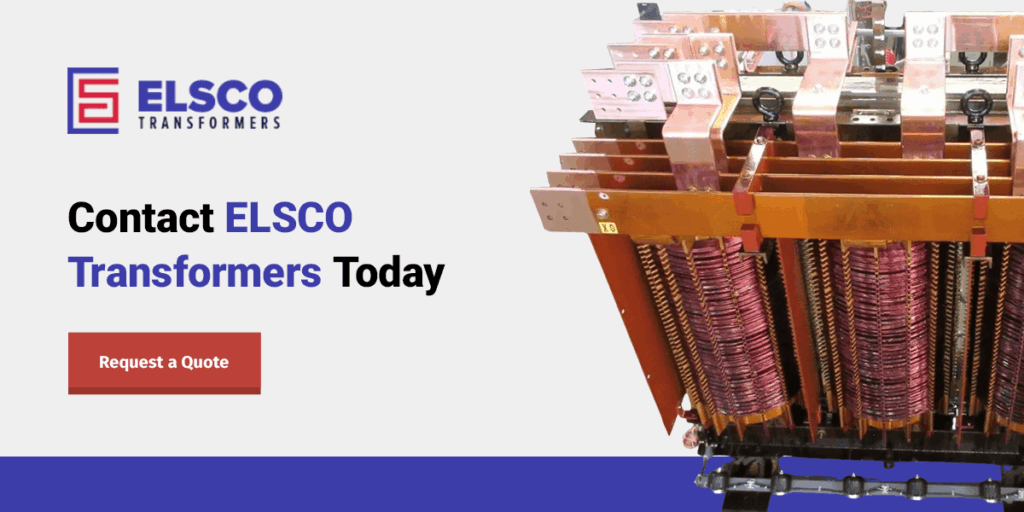
- by Todd Benadum
- April 28, 2025
- Dry Type Transformers, Transformer Build Process
Substation transformers use round, rectangular or, less commonly, oblong core and coil assemblies. Coils facilitate the transformer’s magnetic flux flow. Coils and transformers work together to optimize performance based on design and application requirements.
The transformer’s core shape determines the coil type. In other words, round iron cores must use round coils and so on. But which coil configuration is better for dry type transformers? Understanding these differences encompasses their shapes, voltage capabilities, cooling abilities and cost-effectiveness.
Primary Differences of Round vs. Rectangular Transformer Coils
These two common coil shapes have distinct characteristics for various electrical applications, especially transformers. Under normal operating conditions, round and rectangular coils in dry type transformers behave almost identically. However, each type responds differently under abnormal conditions, such as a short circuit.
The physical differences between round and rectangular coils are straightforward. Another difference between rectangular and round coils in dry type transformers is the negative space within their core configurations. While circular core setups have slight air gaps between the magnetic flux-carrying steel and the windings, rectangular cores entirely fill this gap, resulting in fewer inefficiencies.
Learn More About Our Dry Type Transformers
Round Transformer Coils

Manufacturers often choose a round transformer coil for mechanical strength. Round or cylindrical coils can withstand radial forces while maintaining their circular shape. They have tiny air gaps between the magnetic flux that carries steel and windings. Here are more features that set this coil shape apart from the alternatives.
- Cooling efficiency: A circular shape conducts better heat dissipation and allows the coil to cool more efficiently using insulating fluids like oil.
- Easy manufacturing: Their simple winding process makes producing round coils easier and more cost-effective.
- High-power capacity: Round coils have uniform current distribution and are well-suited for transformers that push high voltages.
- Robustness: Thanks to their robustness and even heat dissipation, round coils are excellent for heavy-duty applications and operation in challenging environments.
Rectangular Transformer Coils
Rectangular or square coils, also known as layer or disc windings, feature four sides and slightly rounded edges. Constructed using flat conductors, they are layered and flat. Importantly, they handle radial forces less effectively than their circular counterparts, usually losing their rectangular shape during a short circuit. However, there are a few advantages to using rectangular transformer coils.
- Space use: With flexible design options, rectangular coils allow for custom configurations that optimize space use in specific transformer designs.
- Customization: These coils have more design flexibility to suit most layout requirements and space limitations.
- Small transformer applications: Rectangular coils are more compact and suitable for low-voltage applications in smaller transformers.

Through-Fault Capabilities
Another noteworthy difference between round and rectangular coils lies in their ability to respond to through faults. A through fault happens outside the transformer zone. When the downstream components do not clear through faults, the transformer will overload and lose its ability to handle the sudden influx of electrical currents running through it. Round coils fare better because of their more uniform stress absorption. They feature fault protections that can reduce the risk of damage due to faults and similar occurrences.
In through-fault scenarios, transformers with round coils tend to fare much better than those with rectangular coils because rectangular coils lose their shape when encountering short circuits. Even if the rectangular coil features restraining or “bracing” devices to help it maintain its shape, a short circuit will likely produce substantial damage. With their uniform stress absorption, round coils are better at handling through faults.
Applications for Dry Type Transformers
Dry type transformers transfer electrical energy between circuits by using electromagnetic induction created by transformer coils. They have primary and secondary coils wrapped around a magnetic core. The primary coil generates a magnetic field that induces the secondary coil’s current, which connects to the load. These transformers do not use a cooling medium, allowing them to use either coil type.
The choice between round versus rectangular coils for dry type transformers comes down to the application. Considerations include space efficiency, mechanical integrity, cooling abilities and voltage applications.
Specific examples include:
- Manufacturing: Production facilities typically install round coils to handle the mechanical stress from heavy machinery and power fluctuations.
- Continuous process and automation: Operations that run 24/7 depend on round coils for their superior fault tolerance and cooling efficiency.
- Colleges and universities: Educational institutions typically install rectangular coil transformers in buildings with confined mechanical rooms and round coils for larger spaces where power stability is critical.
- Hospitals and medical centers: Health care facilities rely on round coils in critical care areas to ensure uninterrupted power for lifesaving equipment and to protect sensitive diagnostic systems.
- Electrical utilities: Power plants use round coils because of their superior voltage handling capabilities and better performance during grid fluctuations and fault conditions.
- Correctional facilities: Correctional facilities typically select rectangular coil transformers for areas with space restrictions while utilizing round coils in areas requiring maximum reliability.
- Electrical contractors: Installation specialists and contractors often recommend round coils for projects prioritizing fault protection and rectangular designs for retrofit work with tight space constraints.
- Electrical supply houses: Distribution businesses stock both coil configurations to meet a complete range of customer needs.
Why Trust ELSCO Transformers?
At ELSCO Transformers, we can analyze your power requirements to recommend the most beneficial coil configuration for your facility. Our experts consider load profiles, available space, fault protection and similar needs to help you get the perfect transformer solution.
We use premium-grade materials for both round and rectangular designs. Our high-conductivity copper windings and high-permeability core steel exceed industry efficiency standards. All our transformers undergo testing for temperature rise, sound levels and short-circuit durability before leaving our facility.
ELSCO Transformers offers rapid delivery options for both coil types, with many common configurations available from stock. Our manufacturing capabilities allow us to produce custom units with shorter lead times than most competitors, helping you meet tight project schedules and minimize downtime.
Contact ELSCO Transformers Today

Round and rectangular coils have benefits to complement various transformer requirements. By design, each shape can optimize their applications’ efficiency, performance and space use. Choosing between these options depends on their voltage rating, space constraints, power capacity and manufacturing considerations. High-voltage transformers use round coils for efficient cooling, while smaller transformers may use rectangular coils for space-saving needs.
Turn to ELSCO Transformers for high-quality dry type transformers. Since 1912, we have provided customers across industries with expert guidance on selecting the correct transformer for their specific applications. Get a free quote when you contact us online or call 800-232-9002 for more information about our transformers today.

